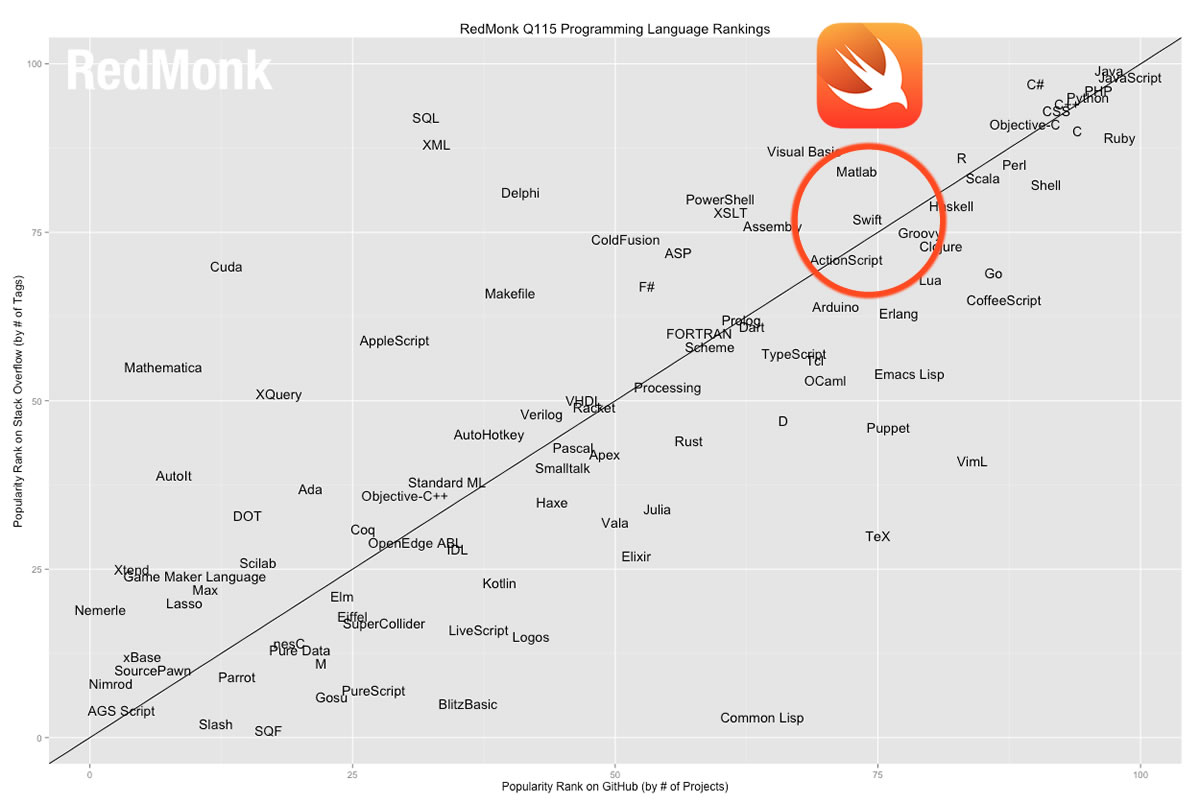Click the graph to see it at full size.
For a programming language that came out in beta in June, Swift’s rise in popularity is quite impressive. Stephen O’Grady writes in his report on Redmonk’s Programming Languages Rankings for Q1 2015, while most of the rankings stayed stable, Swift’s meteoric rise from 68th place in Q3 2014 to its present number 22 spot stands out.
As with any programming language popularity ranking system, Redmonk’s rankings are determined by looking at the online “trail” left by programming language users. Their system uses two key metrics:
- Discussion of the language on Stack Overflow, where discussions are tagged with language names, and
- Projects posted on GitHub, where projects are tagged with language names.
O’Grady writes:
During our last rankings, Swift was listed as the language to watch – an obvious choice given its status as the Apple-anointed successor to the #10 language on our list, Objective-C. Being officially sanctioned as the future standard for iOS applications everywhere was obviously going to lead to growth. As was said during the Q3 rankings which marked its debut, “Swift is a language that is going to be a lot more popular, and very soon.” Even so, the growth that Swift experienced is essentially unprecedented in the history of these rankings. When we see dramatic growth from a language it typically has jumped somewhere between 5 and 10 spots, and the closer the language gets to the Top 20 or within it, the more difficult growth is to come by. And yet Swift has gone from our 68th ranked language during Q3 to number 22 this quarter, a jump of 46 spots. From its position far down on the board, Swift now finds itself one spot behind Coffeescript and just ahead of Lua. As the plot suggests, Swift’s growth is more obvious on StackOverflow than GitHub, where the most active Swift repositories are either educational or infrastructure in nature, but even so the growth has been remarkable. Given this dramatic ascension, it seems reasonable to expect that the Q3 rankings this year will see Swift as a Top 20 language.
The other well-known ranking of programming language popularity, the TIOBE Index, puts Swift at the number 25 position in its January 2015 edition. They just named JavaScript as the 2014 language of the year, but as they observed:
It was a close finish. Swift and R appeared to be the main candidates for the title but due to a deep fall of Objective-C this month, a lot of other languages took advantage of this and surpassed these two candidates at the last moment.
Another interesting way to gauge a programming language’s popularity is to count the Swift courses and the number of students on Udemy. As of this writing, there are 53 Swift courses in English, and another 18 in other languages. Three of these courses have 10,000 students or more, the most popular of which is Rob Percival’s The Complete iOS and Swift Course: Learn by Building 15 Real-World Apps. It has over 53,000 students, who’ve paid as much as $199 (that’s the standard price, but there are often sales where you can sign up for much, much less).
If you’re the sort to try to read the tea leaves of programming language popularity to see what the Really Big Deals this year will be, keep an eye on what I’m calling the “Three M’s”: mobile, modelling data, and massive data. The TIOBE folks seem to agree with this assessment:
It is always tempting to try to forecast what will change in 2015. Objective-C will probably lose its dominant position in mobile app development, whereas Java and Swift will gain traction in that field. Java might even become number one of the TIOBE index again. Other trends in progamming are modelling and big data. Here, MATLAB and R appear to be the market leaders. There is a realistic chance that they will enter the top 10 in 2015.

2 replies on “SWIFTly rising up the programming language charts”
I feel like the axis on that plot could be: “Really Easy Programming questions on a new language” x “github pages for existing iOS apps ported to Switft “
[…] Read full story => GlobalNerdy […]